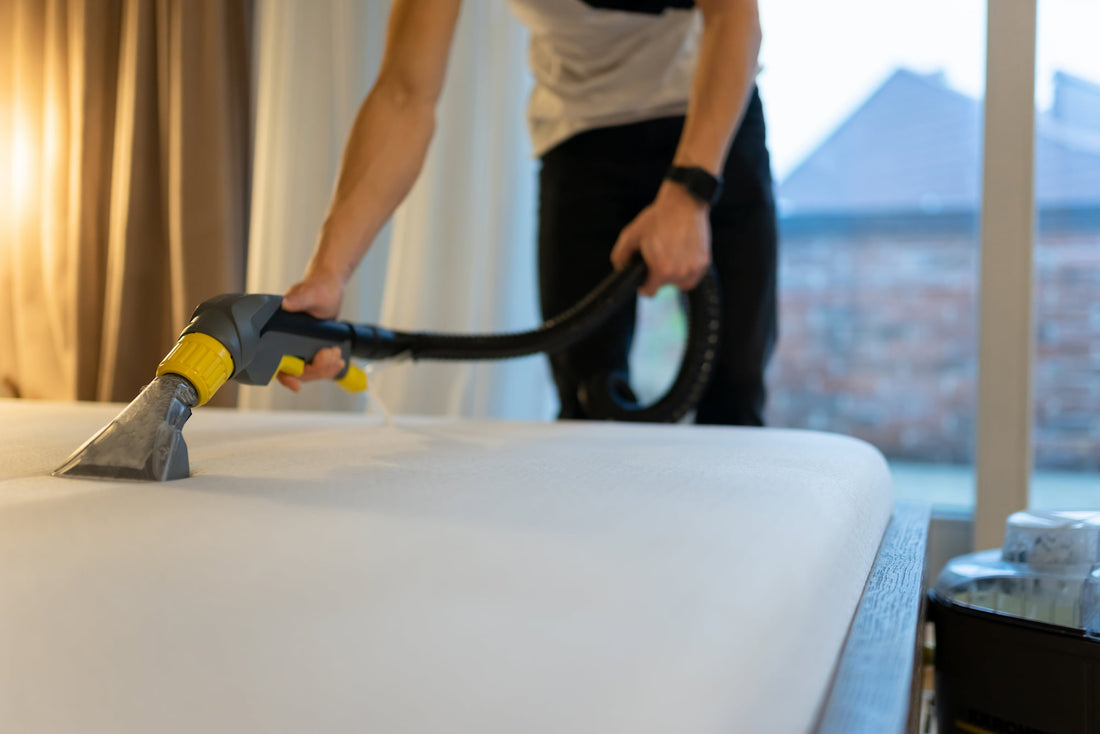No matter the age, bedwetting can be an embarrassing and frustrating experience. It's a secret struggle that many children, teenagers, and even adults face. But despite the taboo, it's more common than many people realise. In fact, about 12% to 25% of four-year-olds, 7% to 10% of eight-year-olds, and 2% to 3% of 12-year-olds experience childhood nocturnal enuresis.
While many people consider bedwetting a physical issue, the reality is that bedwetting can be caused by a variety of factors, many of which are psychological and emotional.
In this post, we want to shed light on the more overlooked causes of bedwetting and how stress, trauma and other life changes can impact nighttime bladder control. By understanding these influences, we can better support children and adults alike, helping them move toward solutions that reduce the risk of bedwetting.
Understanding Bedwetting
Nocturnal enuresis, most commonly known as nighttime bedwetting, is when a person unintentionally urinates while asleep. It is a common phase in childhood, even for children who are fully potty-trained.
Most children naturally stop bedwetting between the ages of 4 and 6, though for some, it continues beyond these years and can even reemerge after some time.
There are two main types of nighttime bedwetting:
- Primary enuresis/ bedwetting: This type of frequent bedwetting has persisted since early childhood without interruption and has never had an extended period of dry nights.
- Secondary enuresis/ bedwetting: This form of bedwetting occurs after a child has been consistently dry at night for at least six months. Secondary bedwetting often suggests an underlying medical or psychological issue.
Read More: What Causes Bedwetting?
Psychological Causes Of Bedwetting
Enuresis in children is often misunderstood as purely a physical or developmental issue, but psychological factors can play a significant role. While bedwetting can sometimes indicate an underlying physical condition, only about 1% of children who wet the bed have an identifiable medical condition.
Emotional stress, major life events and trauma can contribute to bedwetting episodes, especially in children.
Stress and Anxiety
Bedwetting is a common sign of stress and anxiety, especially at night when the body is resting and unaware.
Children can go through a lot. Anxieties around academic pressures, social acceptance, or family tensions can weigh heavily on their minds. Unfortunately, chronic stress can wreak havoc on a child's sleep patterns.
Stress triggers the “fight-or-flight” response, a natural reaction where the body prepares to handle perceived threats. Interestingly, this response can increase urine production. This also means that a child will sleep deeper, where their bladder awareness is not as strong - increasing the likelihood of accidents.
Major Life Changes
Significant life changes—like moving to a new home, starting school, parental conflict and separation, or the arrival of a new sibling—can create feelings of insecurity and stress in children. Feelings they don't know how to express or manage.
These changes can disrupt a child’s routine and emotional stability. Much like stress this can often affect their sleep patterns and, in turn, increase the risk of bedwetting.
Childhood Trauma
A history of physical, emotional, or sexual abuse can have a significant impact on a child's mental and physical well-being. Trauma can lead to conditions like Post-Traumatic Stress Disorder (PTSD), characterised by nightmares, flashbacks, and heightened anxiety, all of which can disrupt sleep and contribute to bedwetting. In some cases, it is believed that bedwetting is a protective mechanism against abuse. Adults who have experienced trauma may also experience bedwetting as a symptom of PTSD.
If you suspect a child is being abused, seeking immediate professional help is crucial.
Bullying and Social Pressure
For children and teenagers, the social and emotional pressures of growing up can be challenging to navigate. This can increase stress and anxiety, and will often manifest in bedwetting. For a child, the fear of social situations or the anticipation of potential humiliation can build up and affect nighttime routines, leading to bedwetting episodes.
ADHD and Bedwetting
Various studies have also shown that bedwetting is common among children with ADHD (Attention Deficit Hyperactivity Disorder). Research suggests that delays in the development of the central nervous system may influence both ADHD symptoms and bladder control.
Children with ADHD may struggle with impulse control and recognising bodily signals, making it harder for them to respond to their bladder during sleep, resulting in bedwetting accidents.
Bedwetting and Self-Esteem
It is important to remember that bedwetting is not a matter of willpower, laziness, or misbehaviour. Most children who wet the bed cannot control it and are not doing so on purpose. While it is a developmental phase that many children outgrow naturally, it can be challenging to navigate.
Bedwetting can take an emotional toll, especially if it persists past the early years when children may start to feel different from their peers. Feelings of shame, embarrassment, or frustration can creep in, affecting a child’s self-confidence and leading to self-doubt. When children participate in social activities, like sleepovers worrying about the possibility of a bedwetting incident can even exacerbate these incidents, creating a cycle: the more they worry about bedwetting, the more likely it may be to happen.
Support & Bedwetting
Bedwetting is common, but that doesn't mean it should control nighttime routines. With empathy, patience, and compassion, bedwetting can be treated, well-managed and with time even fully overcome.
Professional Help
One of the first steps in managing bedwetting is to consult a healthcare professional. Therapy can be a valuable tool in helping children process their emotions and build strategies to address underlying psychological factors, such as stress, anxiety, or past trauma.
Whether it's through individual counselling, family therapy, or behavioral strategies, a professional can work with both the child and family to create a plan that supports emotional well-being and resilience.
Read More: Seeking outside help – when to consult a doctor about bedwetting
Open Communication
Creating a safe and open environment for children to express their feelings is an important first step when supporting a child who is wetting the bed.
Encourage your child to talk about any worries or frustrations they have without fear of judgment or embarrassment. Reassure them that bedwetting is a common experience and that it’s not their fault. Letting them know they are supported and understood can help ease the pressure they may feel and reduce any anxiety or self-blame.
Managing Stress at Home
Reducing stress at bedtime can also make a significant difference in minimising the chances of bedwetting. Establishing a calming nighttime routine helps children wind down and feel secure before sleep. Introducing activities like reading a soothing story, practicing deep breathing exercises, or listening to calming music together even just an hour before bedtime can help children manage stress and anxiety that might be causing accidents.
Positive Reinforcement
Celebrate the progress, not the setbacks! Rewarding dry nights with positive reinforcement—such as stickers or small rewards—can help motivate your child and make the experience more positive. It’s essential to avoid punishing accidents, as this can lead to increased anxiety and the likelihood of accidents. Instead, focus on creating a system of encouragement that builds their confidence.
Bedwetting Alarms
When it comes to managing bedwetting in children, there is no one-size-fits-all solution. Treatment for bedwetting often takes a combination of strategies and approaches. One of the most effective tools is used today is a bedwetting alarm and are a are a safe, non-invasive way to help your child overcome nocturnal enuresis.
With a success rate of over 90%, the Nighthawk Bedwetting Alarm is a trusted enuresis alarm designed to help your child wake up and use the toilet. It is a small, discreet, and wireless wearable device designed to train your child's brain to respond to the sensation of a full bladder during sleep.
When the first trace of urine is detected, the Nighthawk gently emits a sound and vibration to naturally wake your child. Over time, this consistent reminder helps condition your child’s body to wake up naturally when they need to use the bathroom, leading to improved control and more dry nights.
Overcoming Bedwetting With NightHawk
Dealing with bedwetting can often feel like an impossible situation. Sleepless nights, soiled bedding, and the constant worry can take a toll on both children and parents. It’s easy to feel frustrated or helpless, but it's important to remember that bedwetting is a common issue, and with the right support and tools, it can be managed effectively.
If you're looking for an additional tool to support your child's journey toward dry nights, Nighthawk Bedwetting Alarm is the solution you might be looking for. Offering a gentle and effective way to help your child develop bladder awareness and control during sleep, safely waking them at the first sign of wetness. Get it today, or contact us to learn more about how we can help manage bedwetting and regain your child's confidence.


